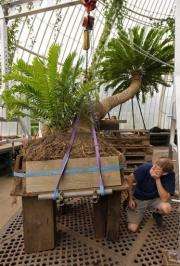UK botanists bank 10% of world's plant species

Botanists at Britain's Kew Gardens have collected seeds from 10 percent of the world's wild plants, their first goal in a long-term project to protect all endangered species, they said Thursday.
Seeds from a wild, pink banana are among the latest additions to the collection at Kew, southwest London, designed to guard against dwindling diversity.
The banana from China, musa itinerans, is an important staple for wild elephants and is also useful for breeding new types of the fruit, but is under threat as its jungle habitat is cleared for commercial agriculture.
It became the 24,200th species of wild plant with seeds stored in the Millennium Seed Bank, a nine-year-old conservation project run by the Royal Botanic Gardens at Kew and institutions in 54 countries.
With it the project reaches its target to collect, bank and conserve seeds from 10 percent of the world's most under-threat wild plant species -- although it is already working towards a new goal of 25 percent of plants by 2020.
"The success we are celebrating today is extraordinary and on a scale never before contemplated in global biodiversity conservation," said Professor Stephen Hopper, director of the Royal Botanic Gardens in west London.
"In a time of increasing concern about loss of biodiversity and climate change, Kew's Millennium Seed Bank partnership provides a real message of hope and is a vital resource in an uncertain world.
"The need for the kind of insurance policy and practical conservation resource Kew's Millennium Seed Bank provides has never been greater."
About 60,000-100,000 species of plant are threatened with extinction -- a quarter of the total -- largely because of human behaviour, whether through the clearing or over-exploitation of land or climate change, Kew officials say.
The seed partnership -- the largest of its kind in the world -- focuses on collecting those plants most at risk and storing them for future use in conservation or for research.
Since 2000, more than 3.5 billion seeds have been collected and stored in air-tight containers in the temperature-controlled vaults at Kew's seed bank near Ardingly, southern England, as well as in their countries of origin.
(c) 2009 AFP

















